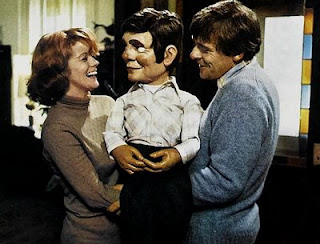 |
| "Hey, how 'bout that threesome?" |
As I watched Richard Attenborough's Magic (1978), I couldn't stop thinking about Jeff Dunham.
For those of you who don't pay attention to pop culture, Jeff Dunham is the reigning ventriloquism king. He smiles his homespun-awww-shucks smile and uses his wooden doppelgangers to spout off hollow, been-there-stereotyped-that jokes for Middle America. He has puppets like Walter, the 80-year old cantankerous coot and Achmed, the Dead Terrorist ("I keeel you!"). I admit that I found Dunham funny the first time I saw him, but the second time I felt his act was tired and one-dimensional.
His puppets sure are cool, though.
So why was I thinking about him while watching Magic?
Well, I wondered what his alone time must be like? Does he talk to himself with his dummies? Does Walter say things privately he would never say on stage? Or does Dunham know how to separate reality from fantasy and keep the wooden critters locked in a box all day until he needs them at night?
Is the guy secretly crazy? Does he think his own puppets are real?
That's the basic idea of Magic. Anthony Hopkins plays Corky Withers, a struggling magician/showman, who flops on his first attempt at amateur night at a local club. He's timid, frustrated, and seems slightly off-kilter, even going so far as to harangue an apathetic crowd for not giving a rat's-ass about the skill involved in the old school "raising aces" trick.
Corky's mentor, the dying Merlin (E.J. Andre), tells him to get a conceit that will draw the audience in. When we pick up with Corky again, he's on the fast track for success as the headliner for the same club he flopped at in the beginning. His new conceit: a dummy named Fats (voiced by Hopkins). Corky's agent, Ben Green (Burgess Meredith) sees a bright future for the magician/ventriloquist, but success seems to be scaring Corky.
So, Corky runs away from the bright lights of the city back to his home spun country roots. This brings him to the guest house of Peggy Ann Snow (Ann-Margret), the woman he had a crush on as a teen who now lives the life of a lonely married woman.
Slowly, but surely, Corky's concept of reality is eroded by his affection for the dummy that expresses his id, and he eventually turns murderous. Fats' creepy face pops up at all the right moments (never creepier than when we see it while Corky and Peggy Ann are knocking boots in Corky's bed), and it's definitely a chilling face.
Unfortunately, Magic is still not a good movie, despite its fantastic cast. I never completely sympathized with Corky, and it was too obvious that the dummy was going to turn him bad. All the kills were easy to predict, and the direction in each murder scene was unclear and pedestrian. It was as if director Richard Attenborough (Ghandi, Shadowlands) went to Alfred Hitchcock school for a night and thought that made him capable of directing an evocative death scene. What he forgot was that in order for a death scene to work, you have to legitimately care about the victim, and I found it very hard to care for anyone in this story but Peggy Ann, whom Ann-Margret plays with a bittersweetness I found charming and real.
Movies about dolls, ventrioquist dummies and the like are usually so chilling for us because it's hard for many people not to want to see life in what is a shell of a person. Many dolls and dummies are not just shells, but absurdly perverse looking humans, too, which only adds to the creep-factor. Unfortunately, movies about this conceit can only go one of two ways -- either the dolls/dummies are real, or it's all in the imagination of the characters. Sometimes, it works, like in Child's Play, or in the classic Twilight Zone episode, "The Dummy." Mostly, it does not. We are left more with indelible images of evil than actual story. The best movie in the genre that shakes up this concept is May, a picture about a fucked-up young woman who attempts to make her own doll.
In the end I was left with the idea of Jeff Dunham, driven insane by his cast of dummies. Now, that would be magic!
No comments:
Post a Comment